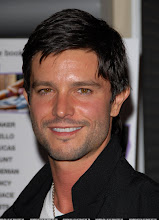So, how did they ever make a movie of Lolita?
Adaptations of Vladimir Nabokov's controversial novel have been attempted twice. The first in 1962 and the second in 1997. Now I'm shocked that Adrian Lyne attempted to remake a classic, especially one that stirred up so much commotion with the censors, the Catholic League of Decency, and the American public.
In the novel, Lolita was 12 and homely. Now, I don't think an audience can truly accept a middle-aged man and a 12-year-old in a sexual relationship. So her age was bumped up 2 years. Also they made Lolita pretty, making her more sexually desirable. I think if they made Lolita homely, as Nabokov described, the audience would not understand Humbert's obsession and attraction.
The acting was great in this film with Peter Sellers leading the pack. His Quilty was so neurotic and strange and eccentric and marvelous! James Mason was articulate and subtly obsessed with the titular nymphet. I like how Mason wasn't so dramatic, he didn't chew scenery, he knew what was enough for the scene.
Sue Lyon was interesting, in being in the 1960s, you didn't think of 14-year-olds being sexually knowledgeable. And Sue Lyon embodied it. Her acting style is definitely more natural than Mason who seems more self-possessed in his performance. But Lyon's natural and unrefined style makes her more like a real teenager.
Suggestion is a powerful tool when used properly. Kubrick used it very well, because the censors would not allow basically anything described in the novel. However, Lyne's version had no suggestion. It was the '90s, and things changed. No longer do we have to postulate the relationship between Humbert and Lolita. Now we see it!
I had several problems with Lyne's adaptation. One, I feel he was trying too hard. It's an enormous pressure trying to make a movie that's on par with a Stanley Kubrick film. Two, Jeremy Irons was a drama queen as Humbert. Also he was easy to walk over. Lyne made him out to be the victim instead of Lolita.
The new Lolita focuses more on the obsession instead of the love. In the original, Humbert was obsessed but it was more downplayed. Lyne also has a habit of using slow motion and dramatic, sappy elevator music to convey a mood. He tried to make his shots complex, I guess he wanted it to look artistic. But it wasn't. Sometimes, simple is just better.
Now, let's compare the two Lolita interpretations. Personally, I like Sue Lyon better than Dominique Swain. Swain's Lolita is vulgar and obnoxious and immature. She acts younger than 14. Lyon's Lolita is more like a savvy teen. She's cool and manipulative, but she still shows signs of a young girl. Especially when they show her eating. She completely disregards table manners and chews her gum with her mouth open. Lyon is the reason we call certain teen girls "Lolitas."
Swain is more innocent-looking, but not completely virginal either. You kinda don't know what to expect from her. She was quite annoying at times, and it's hard to like her because you can't help but see the ridiculousness in a grown man fawning over her. That's why Kubrick made Lolita more sexy. But in the innocence corrupted department, Swain wins.
First impressions must also leave lasting impressions. A character's entrance is important in orchestrating how a character should be established and interpreted by the audience. Lyon's was more overt and suggestive. Humbert comes upon her sitting in the backyard in a bikini reading a magazine and playing the radio. Swain's is not completely innocent. She laying on the ground, reading, while a sprinkler is spraying her with water. It's like a wet t-shirt contest, only nothing is shown. Kubrick's Lolita wins this round.
Kubrick's is definitely superior, especially since they couldn't get away with a lot. It got every point across just with suggestion. Remember Humbert and Lolita never kissed once. I think too much is shown in movies today. It's kinda insulting, really. Film makers think we're too stupid to understand things, and think we have to see everything to put things together.
Just because I am a part of the visual generation, doesn't mean I watch movies like some of them.


.jpg)




1 comment:
Okay, I admit I am one of those people who freak when good books are made into movies. Don't get me started on the litany of books ruined by film...okay,so you asked...Prince of Tides,Practical Magic;okay,I'll stop.
I do agree,Kubrick's, Lolita was powerful. I did always think James Mason was perfect for that part.
Post a Comment